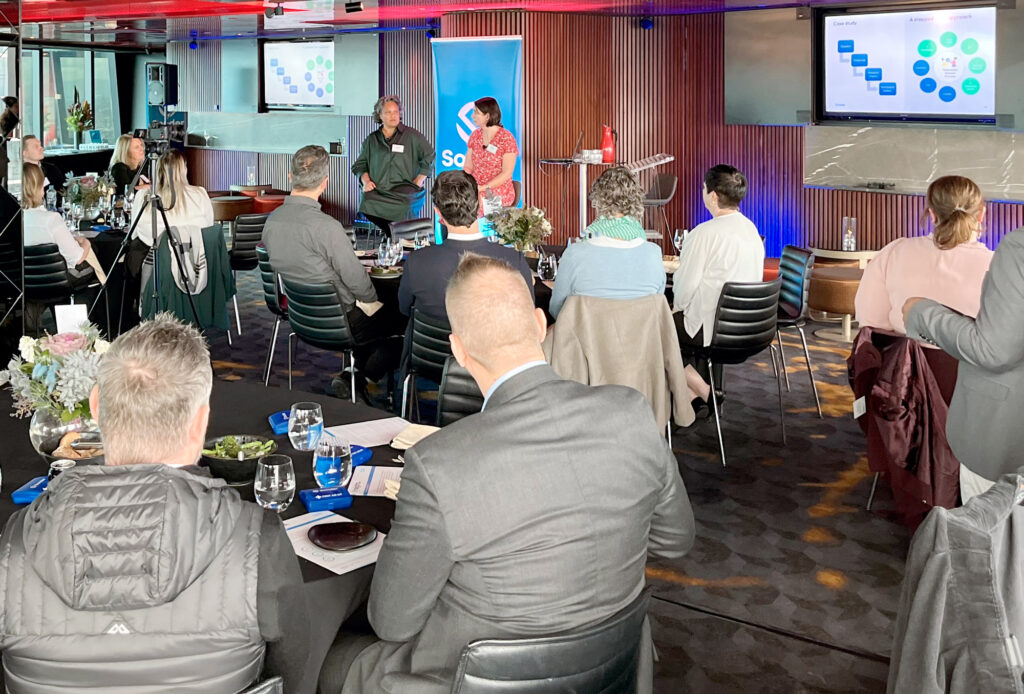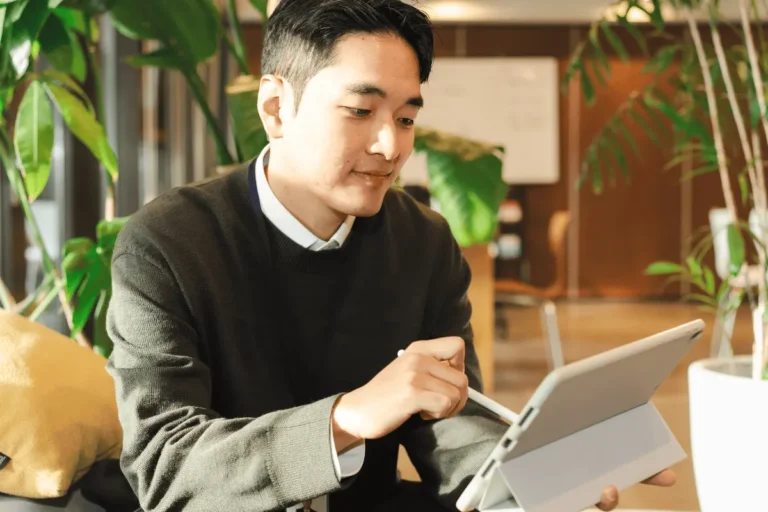Incidents of aggression from customers can be extremely stressful for frontline workers, and potentially have long-term impacts on employees and their organisations. Last week in Melbourne we gathered a selection of business leaders to discuss this important topic, highlight some sobering statistics, share real-life stories, and explore new ways to better support a workforce in distress.
We were delighted to welcome the following guest speakers:
- Keynote speaker:
- Rebecca Goulter (Director of Marketing and Events, National Retail Association)
- Health and wellbeing panel:
- Kim Powell (Director of Nursing, Sonder)
- Louise Butler (Head of Psychological Services, Sonder)
- Retail and hospitality panel:
- Nicole Everingham (General Manager, Workplace Health and Safety, HOYTS Group)
- Georgia Danos (State Safety, Health and Wellbeing Manager – VIC/TAS, Woolworths Group)
- Christopher Marr (Co-founder and CCO, Sonder)
Sobering statistics
Sonder’s co-founder and CCO, Christopher Marr opened the event with some hard-hitting statistics from our survey of 1,025 employees in Australia:
- According to the survey, 68 per cent of retail and wholesale trade sector employees have experienced aggression from customers
- Close to half (49 per cent) of these workers did not receive any workplace support after the incident
- Over one third (35 per cent) of the employees in the retail and wholesale trade sector have taken time off work due to concerns about their mental wellbeing; and
- Eighty-six per cent of employees have taken on extra work duties as a result (which is 10 per cent higher than the full cohort result across all industries).
Marr reminded the audience that the team members represented in the statistics were often young people who may be employed casually and working in their first job, with limited experience in handling aggression from customers.
He looked to organisations to better understand and alleviate the wide-ranging impact of customer hostility on their people – not only because of the cost to their organisation’s bottom line but also because of their moral obligation to do so.
“When [employees] take time off, as often is the case, it impacts those around them, not just at home… their families and loved ones… but also their workmates and colleagues. We call that the ripple effect.”
Christopher Marr
Co-founder and CCO, Sonder
Customer aggression increased by up to 400%
Keynote speaker Rebecca Goulter from the National Retail Association (NRA) shared confronting industry statistics gathered through surveying NRA members. For example, according to one NRA poll, customer aggression increased by up to 400 per cent during the pandemic.
Goulter shared that COVID-19 had forced retail workers to face significant new challenges, with employees shouldering the burden of being essential workers, with considerable risk to their health and wellbeing.
She said that frontline workers reported having their lives threatened and were struggling to deal with abuse while managing the potentially long-lasting, after-effects of hostile interactions with customers.
“We have a reduction in the number of people at work, and customers are volatile and abusive because of this… This abusive behaviour is unsustainable and it is a drain on the mental health of our workers.”
Rebecca Goulter
Director of Marketing and Events, National Retail Association
Goulter said her industry needed to enact a cultural change and normalise conversations about mental health in the workplace, plus provide more training to create resilience and psychological safety.
She added that these conversations needed to be had every day, not just on specific dates on the calendar and that leaders needed to be examples to their employees.
Goulter urged retail leaders to set mental health benchmarks as part of their strategic planning and budgeting, and to identify who was responsible for safeguarding the mental health of their employees. She called on retailers to create a mental health workplace action plan and to showcase their commitment to a mentally healthy workplace.
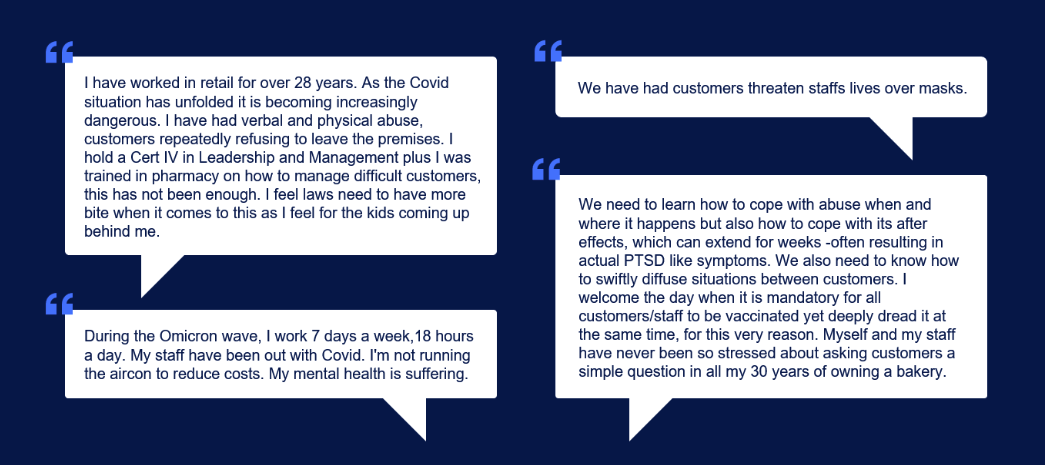
Personal and workplace impact
Two of Sonder’s medical experts, Kim Powell and Louise Butler, then talked the audience through a real-life case study that illustrated how customer aggression can have both a personal and workplace impact.
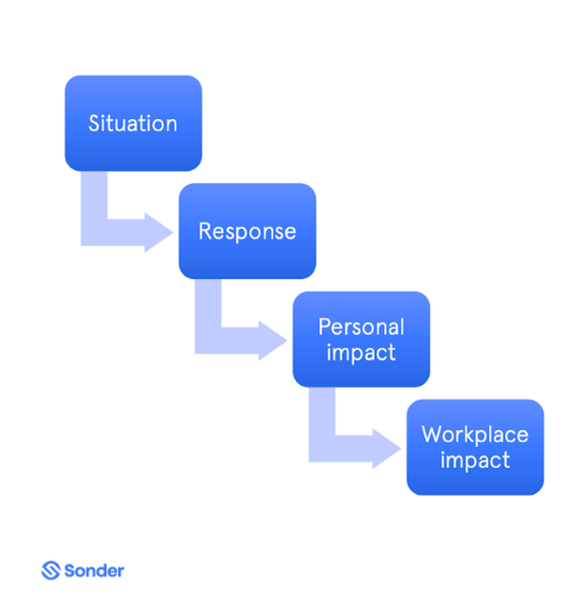
Powell and Butler shared the story of a 22-year old retail worker who had been verbally and physically assaulted at work. She reported the incident to her manager, who had asked her to take a 20-minute break and to call a support person. The manager then stayed with the customer while the employee contacted Sonder.
As a result of the incident:
- The worker wasn’t eating or attending work as she didn’t feel safe.
- She was experiencing consequent financial issues, demonstrating the personal impact the incident had on her life.
- The member also revealed that she had experienced sexual harassment by a customer at the same store six months earlier.
- The incidents had triggered her to restart using drugs and alcohol as a coping mechanism.
- The member’s manager also sought support as they felt they had let the worker and wider team down, illustrating the far-reaching workplace impact of the incident.
- The member’s colleagues noted that she was struggling to come back to work, so their perception of workplace safety had also decreased, which demonstrated the ripple effect that the incident had on the wider work team.
“This member needed support to get her back on track and back to work. But we also supported management so that they could improve on the culture in the workplace and also improve on their knowledge about mental health…”
Louise Butler
Head of Psychological Services, Sonder
Butler encouraged the audience to review their current processes with a lens to ensure their people are supported as best as possible. She also stressed the importance of follow-up as a crucial element of recovery.
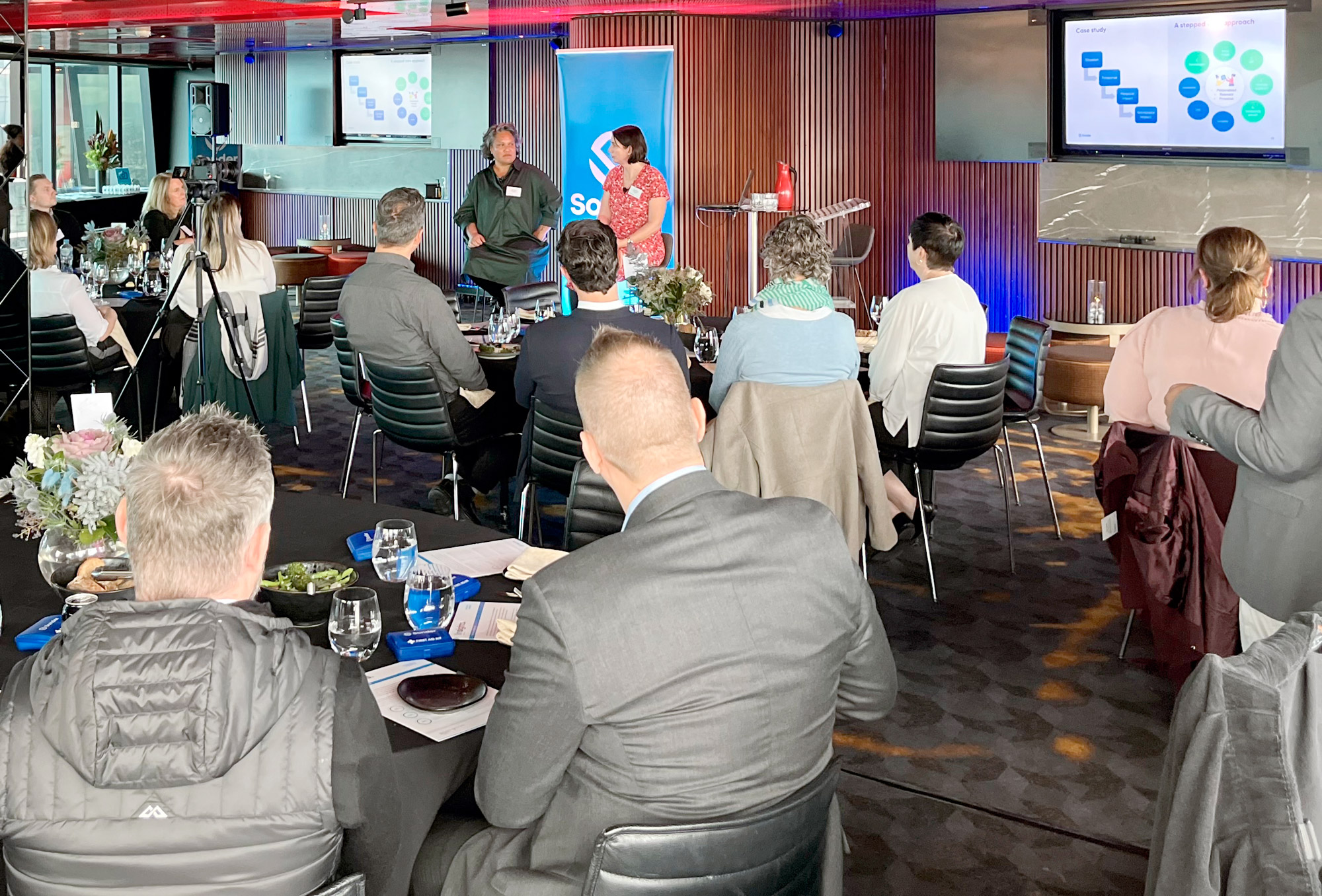
How to help
In addition to walking the audience through Sonder’s wellbeing framework, Powell and Butler shared some practical and actionable insights for audience members to remember when supporting their team members.
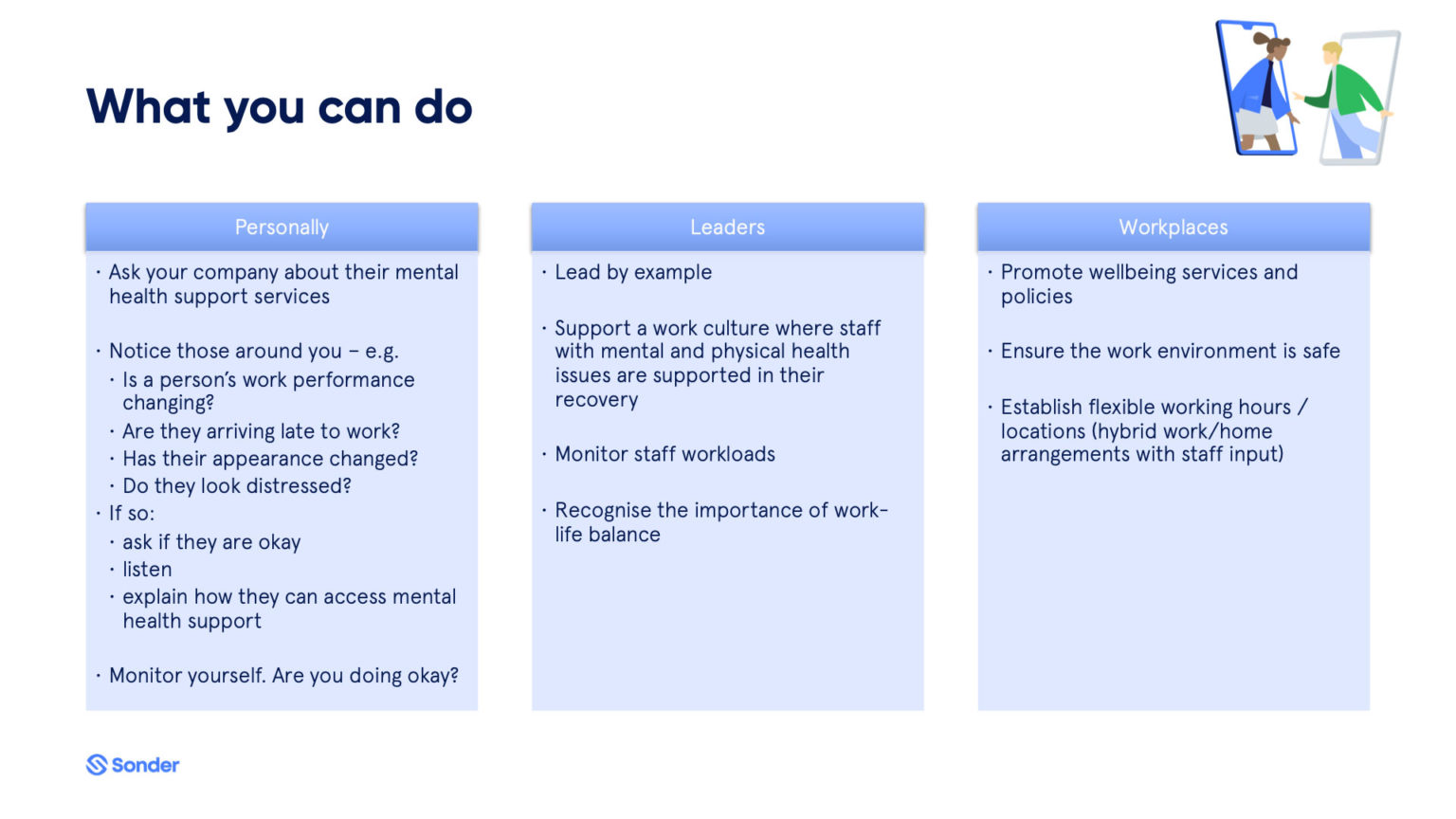
“We want you to let your managers know that they’re not counsellors, they’re not therapists, and they’re not meant to be… Call us, or chat with us, we’re more than happy to help. You’re not expected to be counselling your employees, that’s our job.”
Kim Powell
Director of Nursing, Sonder
Industry spotlight
The final session was a Q&A session featuring Nicole Everingham and Georgia Danos, hosted by Christopher Marr.
Key insights included:
- From Georgia Danos (Woolworths Group):
- Supermarket workers were “lifesavers” during the pandemic. Examples included frontline workers assisting elderly customers during a medical episode in-store, while a senior leader was on the phone with a critical responder at Sonder. Supermarket workers were at the frontline trying to feed Australia, while also being a care point for their broader community.
- Woolworths employees understand that customer interactions are not always going to be perfect, but also know that [violence and aggression] are not okay.
- Store members and managers can’t be everything for everybody, and additional 24/7 support is crucial.
- To normalise discussions around mental health, it is important to also support team members in conversations about the ripple effect, and the impact that things can have on their lives and the wellbeing of everyone around them.
- From Nicole Everingham (HOYTS Group):
- Hoyts is doing a lot of work around de-escalation – helping team members to understand when to escalate a matter if a customer’s request is unreasonable. Employees seem to be understanding that there are avenues they can take to get assistance to resolve an issue.
- Hoyts is now offering employees and their families support through Sonder and has noticed an uptick in both crew members and managers accessing immediate, confidential care. Maybe also because access is faster and easier, because, before Sonder, employees had to go through a manager to access their Employee Assistance Program (EAP).
- Hoyts has embraced social media as a key channel to communicate with their relatively young cohort. This has included recent Tik-Tok style videos on managing interactions with customers in distress.
“It’s about empowering our people to know how to keep themselves safe, and their teams safe, but also protecting the customers that are in our spaces too.”
Georgia Danos
State Safety, Health and Wellbeing Manager – VIC/TAS, Woolworths Group
Ready to improve productivity and employee wellbeing?
Sonder is a workforce health and safety platform that provides the right care at the right time for personal safety, medical, and mental health needs. The Sonder app offers 24/7 immediate connection to expert support via chat or call, personal safety tools like smart check-ins and journey tracking, and access to wellbeing resources such as personal assessments and self-care content.
For more information about how Sonder can help you reduce people related risks and costs, ensure compliance, and build a resilient, productive workforce, we invite you to contact us here.
About Sonder
Sonder is a technology company that helps organisations improve the wellbeing of their people so they perform at their best. Our mobile app provides immediate, 24/7 support from a team of safety, medical, and mental health professionals – plus onsite help for time-sensitive scenarios. Accredited by the Australian Council on Healthcare Standards (ACHS), our platform gives leaders the insights they need to act on tomorrow’s wellbeing challenges today.
